Cognitive Development: Theories, Parental Influence, and Education
VerifiedAdded on 2021/04/24
|10
|2667
|109
Essay
AI Summary
This essay delves into the multifaceted realm of cognitive development in children, exploring various contributing factors and influential theories. It examines the roles of both environmental and biological factors, highlighting their impact on a child's learning and development. The essay provides an overview of Piaget's theory, along with other key perspectives, and assesses the significance of parental involvement, emphasizing how parental styles and educational engagement shape a child's experiences and academic achievements. The essay also touches upon the influence of social environments and how schools can foster cognitive growth. Finally, it explores pedagogies, the significance of a healthy environment, and provides a self-reflective analysis of the author's insights, emphasizing the importance of appropriate parenting styles and the impact of socioeconomic factors. This paper highlights the importance of creating a supportive environment for a child's growth and development.
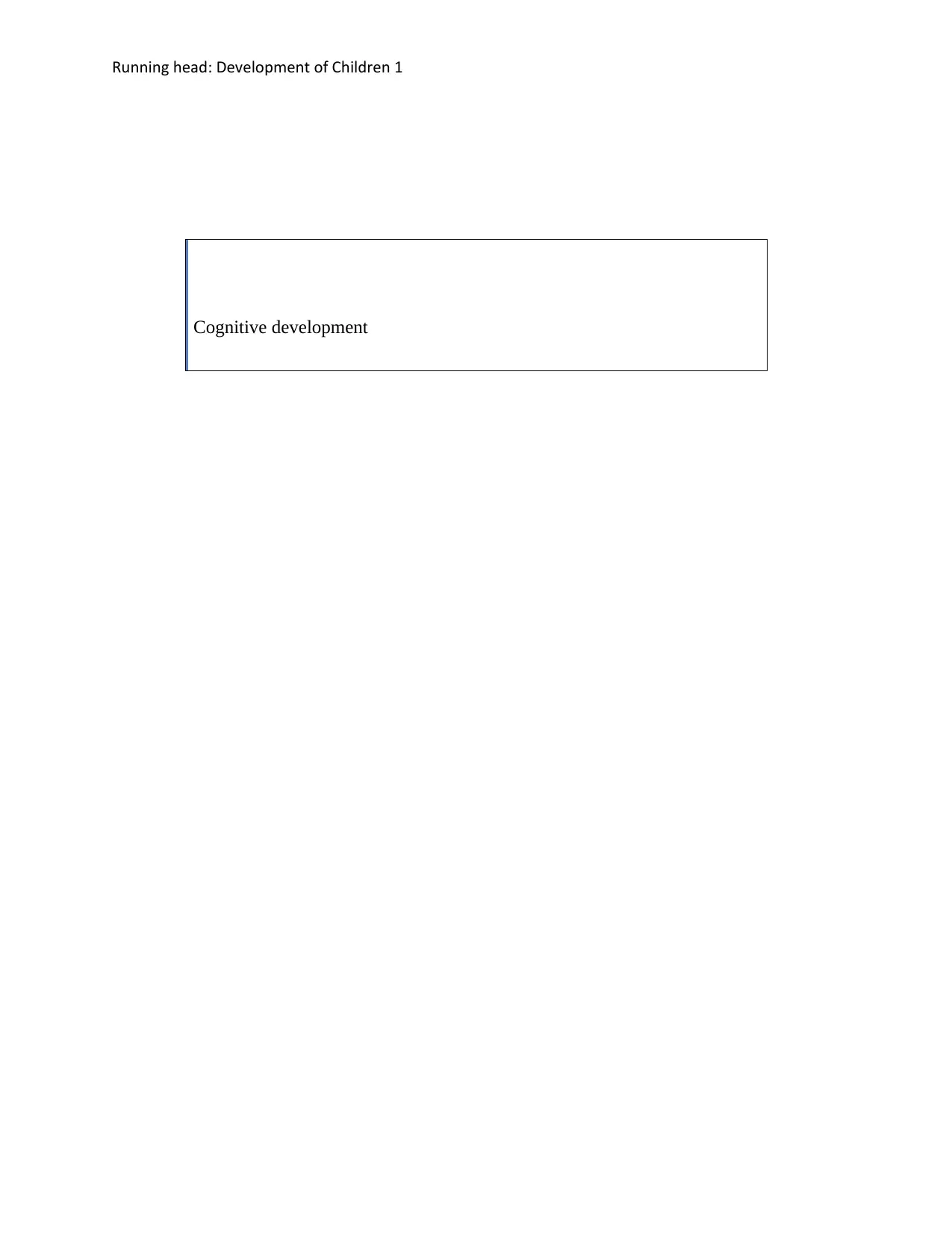
Running head: Development of Children 1
Cognitive development
Cognitive development
Paraphrase This Document
Need a fresh take? Get an instant paraphrase of this document with our AI Paraphraser
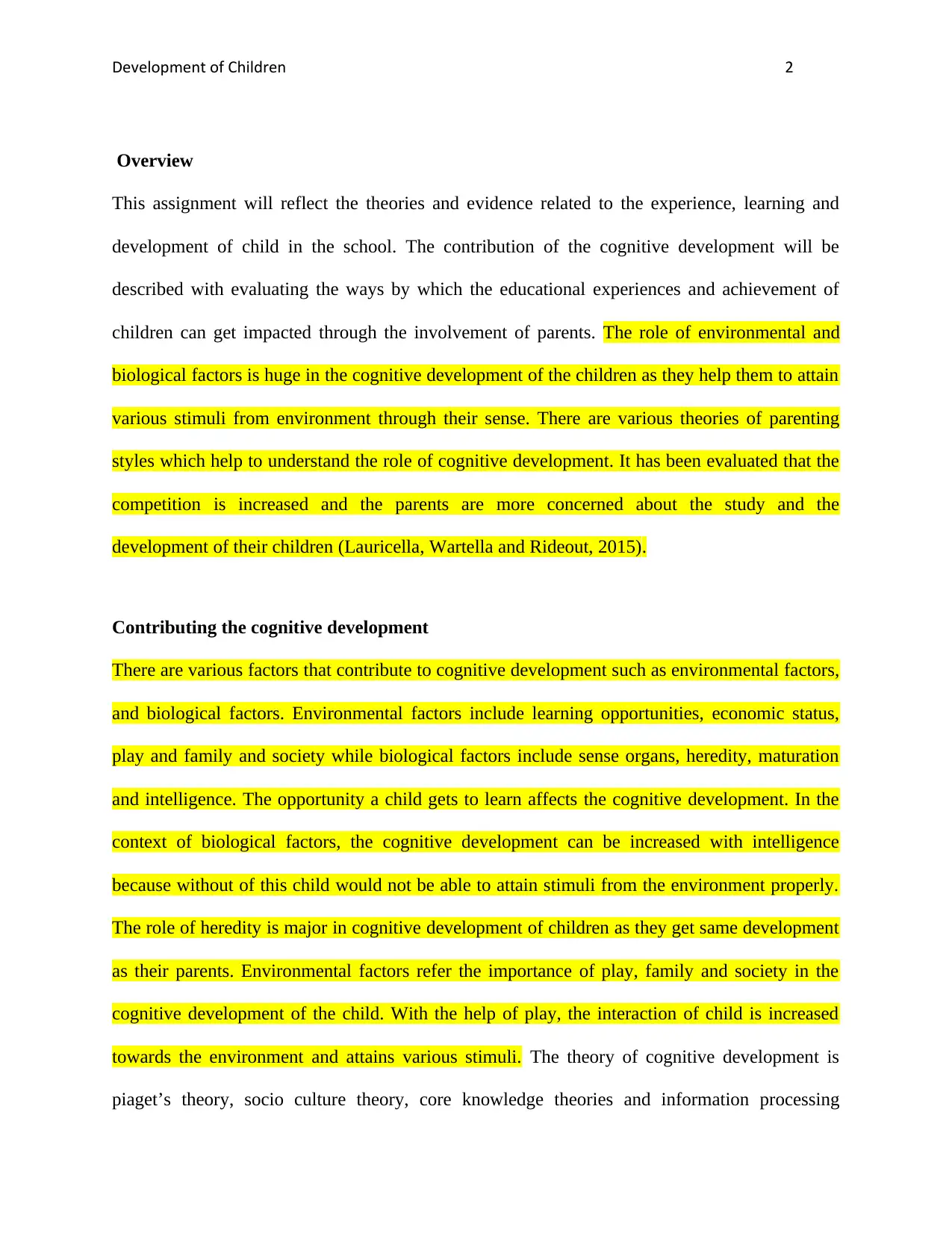
Development of Children 2
Overview
This assignment will reflect the theories and evidence related to the experience, learning and
development of child in the school. The contribution of the cognitive development will be
described with evaluating the ways by which the educational experiences and achievement of
children can get impacted through the involvement of parents. The role of environmental and
biological factors is huge in the cognitive development of the children as they help them to attain
various stimuli from environment through their sense. There are various theories of parenting
styles which help to understand the role of cognitive development. It has been evaluated that the
competition is increased and the parents are more concerned about the study and the
development of their children (Lauricella, Wartella and Rideout, 2015).
Contributing the cognitive development
There are various factors that contribute to cognitive development such as environmental factors,
and biological factors. Environmental factors include learning opportunities, economic status,
play and family and society while biological factors include sense organs, heredity, maturation
and intelligence. The opportunity a child gets to learn affects the cognitive development. In the
context of biological factors, the cognitive development can be increased with intelligence
because without of this child would not be able to attain stimuli from the environment properly.
The role of heredity is major in cognitive development of children as they get same development
as their parents. Environmental factors refer the importance of play, family and society in the
cognitive development of the child. With the help of play, the interaction of child is increased
towards the environment and attains various stimuli. The theory of cognitive development is
piaget’s theory, socio culture theory, core knowledge theories and information processing
Overview
This assignment will reflect the theories and evidence related to the experience, learning and
development of child in the school. The contribution of the cognitive development will be
described with evaluating the ways by which the educational experiences and achievement of
children can get impacted through the involvement of parents. The role of environmental and
biological factors is huge in the cognitive development of the children as they help them to attain
various stimuli from environment through their sense. There are various theories of parenting
styles which help to understand the role of cognitive development. It has been evaluated that the
competition is increased and the parents are more concerned about the study and the
development of their children (Lauricella, Wartella and Rideout, 2015).
Contributing the cognitive development
There are various factors that contribute to cognitive development such as environmental factors,
and biological factors. Environmental factors include learning opportunities, economic status,
play and family and society while biological factors include sense organs, heredity, maturation
and intelligence. The opportunity a child gets to learn affects the cognitive development. In the
context of biological factors, the cognitive development can be increased with intelligence
because without of this child would not be able to attain stimuli from the environment properly.
The role of heredity is major in cognitive development of children as they get same development
as their parents. Environmental factors refer the importance of play, family and society in the
cognitive development of the child. With the help of play, the interaction of child is increased
towards the environment and attains various stimuli. The theory of cognitive development is
piaget’s theory, socio culture theory, core knowledge theories and information processing
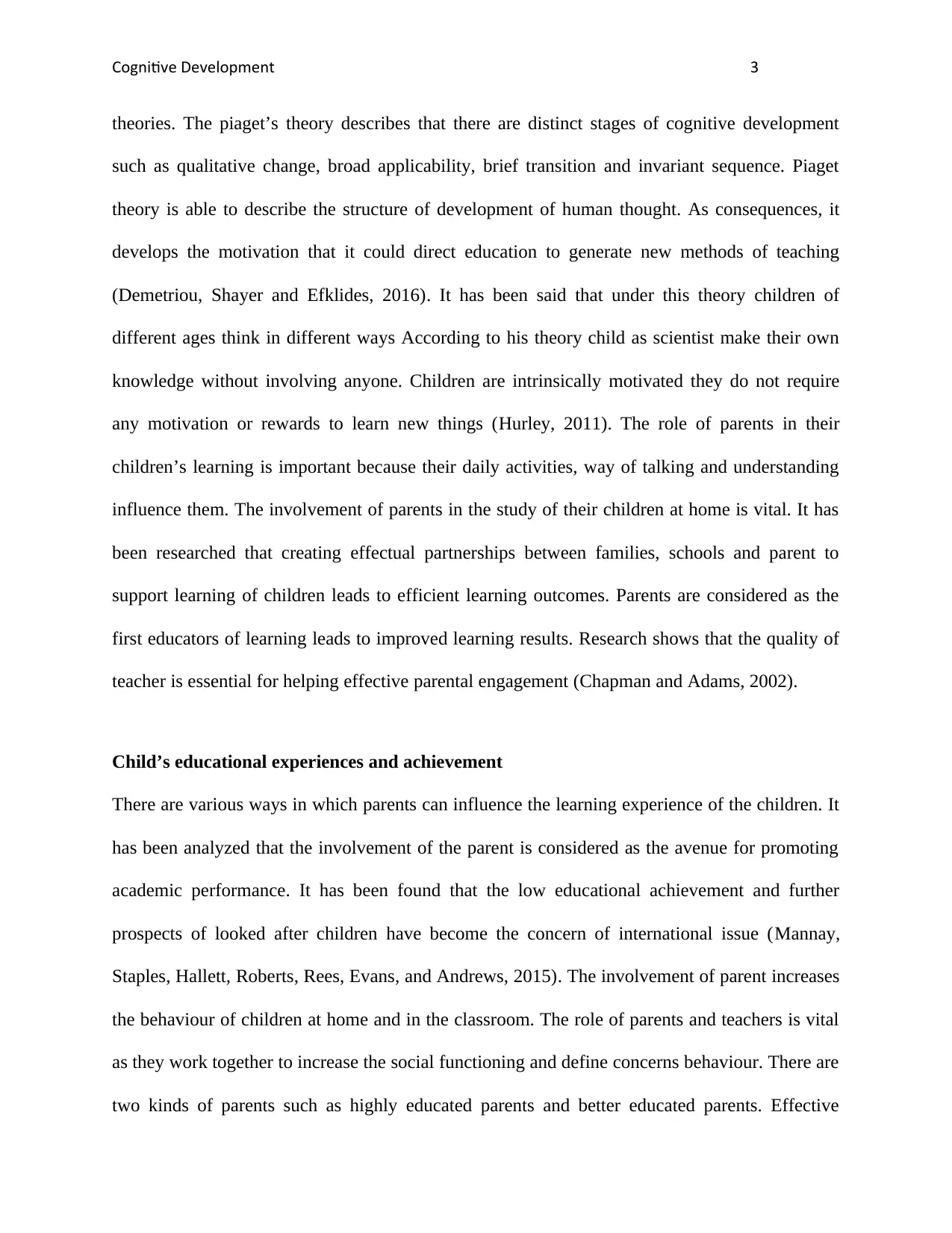
Cognitive Development 3
theories. The piaget’s theory describes that there are distinct stages of cognitive development
such as qualitative change, broad applicability, brief transition and invariant sequence. Piaget
theory is able to describe the structure of development of human thought. As consequences, it
develops the motivation that it could direct education to generate new methods of teaching
(Demetriou, Shayer and Efklides, 2016). It has been said that under this theory children of
different ages think in different ways According to his theory child as scientist make their own
knowledge without involving anyone. Children are intrinsically motivated they do not require
any motivation or rewards to learn new things (Hurley, 2011). The role of parents in their
children’s learning is important because their daily activities, way of talking and understanding
influence them. The involvement of parents in the study of their children at home is vital. It has
been researched that creating effectual partnerships between families, schools and parent to
support learning of children leads to efficient learning outcomes. Parents are considered as the
first educators of learning leads to improved learning results. Research shows that the quality of
teacher is essential for helping effective parental engagement (Chapman and Adams, 2002).
Child’s educational experiences and achievement
There are various ways in which parents can influence the learning experience of the children. It
has been analyzed that the involvement of the parent is considered as the avenue for promoting
academic performance. It has been found that the low educational achievement and further
prospects of looked after children have become the concern of international issue (Mannay,
Staples, Hallett, Roberts, Rees, Evans, and Andrews, 2015). The involvement of parent increases
the behaviour of children at home and in the classroom. The role of parents and teachers is vital
as they work together to increase the social functioning and define concerns behaviour. There are
two kinds of parents such as highly educated parents and better educated parents. Effective
theories. The piaget’s theory describes that there are distinct stages of cognitive development
such as qualitative change, broad applicability, brief transition and invariant sequence. Piaget
theory is able to describe the structure of development of human thought. As consequences, it
develops the motivation that it could direct education to generate new methods of teaching
(Demetriou, Shayer and Efklides, 2016). It has been said that under this theory children of
different ages think in different ways According to his theory child as scientist make their own
knowledge without involving anyone. Children are intrinsically motivated they do not require
any motivation or rewards to learn new things (Hurley, 2011). The role of parents in their
children’s learning is important because their daily activities, way of talking and understanding
influence them. The involvement of parents in the study of their children at home is vital. It has
been researched that creating effectual partnerships between families, schools and parent to
support learning of children leads to efficient learning outcomes. Parents are considered as the
first educators of learning leads to improved learning results. Research shows that the quality of
teacher is essential for helping effective parental engagement (Chapman and Adams, 2002).
Child’s educational experiences and achievement
There are various ways in which parents can influence the learning experience of the children. It
has been analyzed that the involvement of the parent is considered as the avenue for promoting
academic performance. It has been found that the low educational achievement and further
prospects of looked after children have become the concern of international issue (Mannay,
Staples, Hallett, Roberts, Rees, Evans, and Andrews, 2015). The involvement of parent increases
the behaviour of children at home and in the classroom. The role of parents and teachers is vital
as they work together to increase the social functioning and define concerns behaviour. There are
two kinds of parents such as highly educated parents and better educated parents. Effective
⊘ This is a preview!⊘
Do you want full access?
Subscribe today to unlock all pages.

Trusted by 1+ million students worldwide
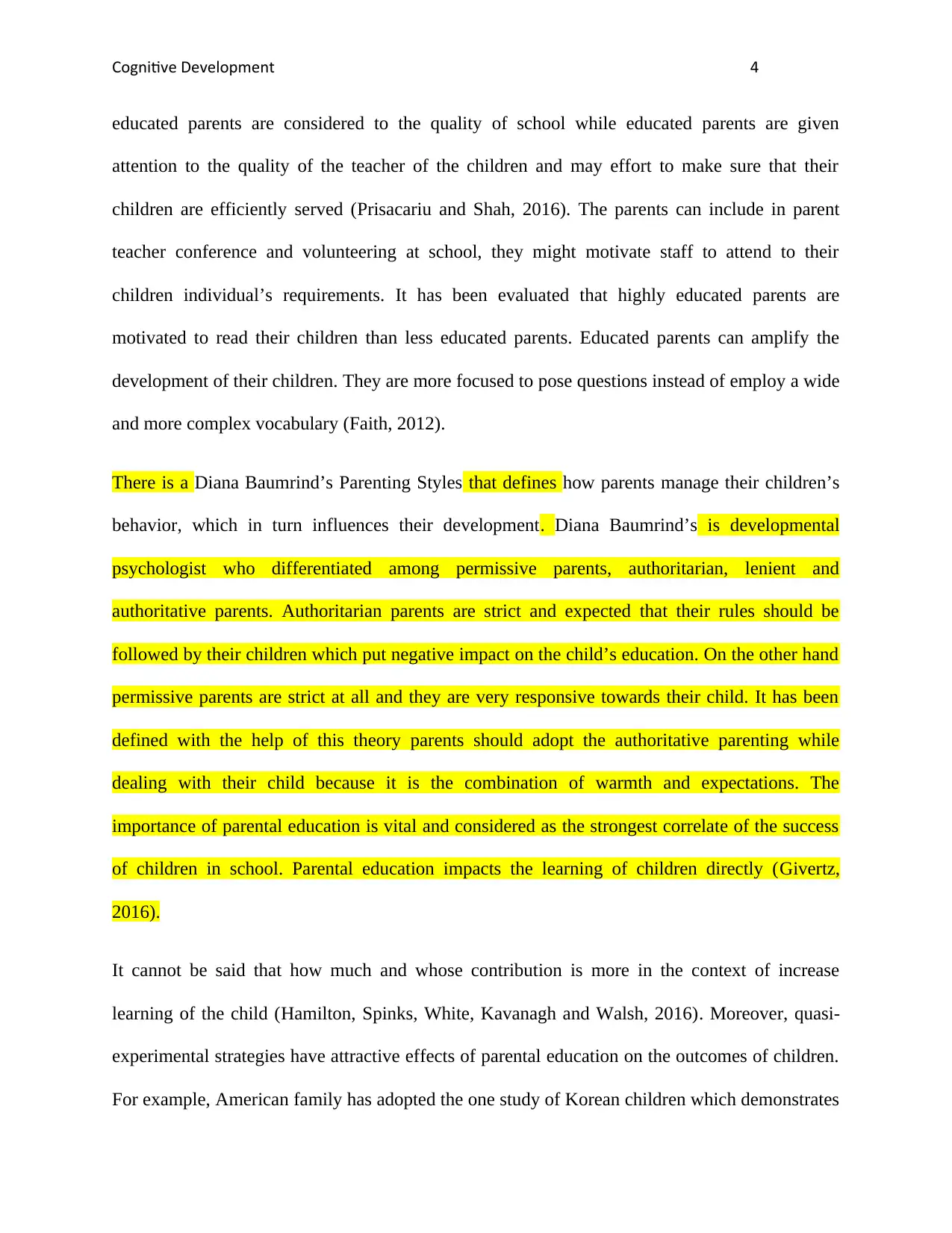
Cognitive Development 4
educated parents are considered to the quality of school while educated parents are given
attention to the quality of the teacher of the children and may effort to make sure that their
children are efficiently served (Prisacariu and Shah, 2016). The parents can include in parent
teacher conference and volunteering at school, they might motivate staff to attend to their
children individual’s requirements. It has been evaluated that highly educated parents are
motivated to read their children than less educated parents. Educated parents can amplify the
development of their children. They are more focused to pose questions instead of employ a wide
and more complex vocabulary (Faith, 2012).
There is a Diana Baumrind’s Parenting Styles that defines how parents manage their children’s
behavior, which in turn influences their development. Diana Baumrind’s is developmental
psychologist who differentiated among permissive parents, authoritarian, lenient and
authoritative parents. Authoritarian parents are strict and expected that their rules should be
followed by their children which put negative impact on the child’s education. On the other hand
permissive parents are strict at all and they are very responsive towards their child. It has been
defined with the help of this theory parents should adopt the authoritative parenting while
dealing with their child because it is the combination of warmth and expectations. The
importance of parental education is vital and considered as the strongest correlate of the success
of children in school. Parental education impacts the learning of children directly (Givertz,
2016).
It cannot be said that how much and whose contribution is more in the context of increase
learning of the child (Hamilton, Spinks, White, Kavanagh and Walsh, 2016). Moreover, quasi-
experimental strategies have attractive effects of parental education on the outcomes of children.
For example, American family has adopted the one study of Korean children which demonstrates
educated parents are considered to the quality of school while educated parents are given
attention to the quality of the teacher of the children and may effort to make sure that their
children are efficiently served (Prisacariu and Shah, 2016). The parents can include in parent
teacher conference and volunteering at school, they might motivate staff to attend to their
children individual’s requirements. It has been evaluated that highly educated parents are
motivated to read their children than less educated parents. Educated parents can amplify the
development of their children. They are more focused to pose questions instead of employ a wide
and more complex vocabulary (Faith, 2012).
There is a Diana Baumrind’s Parenting Styles that defines how parents manage their children’s
behavior, which in turn influences their development. Diana Baumrind’s is developmental
psychologist who differentiated among permissive parents, authoritarian, lenient and
authoritative parents. Authoritarian parents are strict and expected that their rules should be
followed by their children which put negative impact on the child’s education. On the other hand
permissive parents are strict at all and they are very responsive towards their child. It has been
defined with the help of this theory parents should adopt the authoritative parenting while
dealing with their child because it is the combination of warmth and expectations. The
importance of parental education is vital and considered as the strongest correlate of the success
of children in school. Parental education impacts the learning of children directly (Givertz,
2016).
It cannot be said that how much and whose contribution is more in the context of increase
learning of the child (Hamilton, Spinks, White, Kavanagh and Walsh, 2016). Moreover, quasi-
experimental strategies have attractive effects of parental education on the outcomes of children.
For example, American family has adopted the one study of Korean children which demonstrates
Paraphrase This Document
Need a fresh take? Get an instant paraphrase of this document with our AI Paraphraser
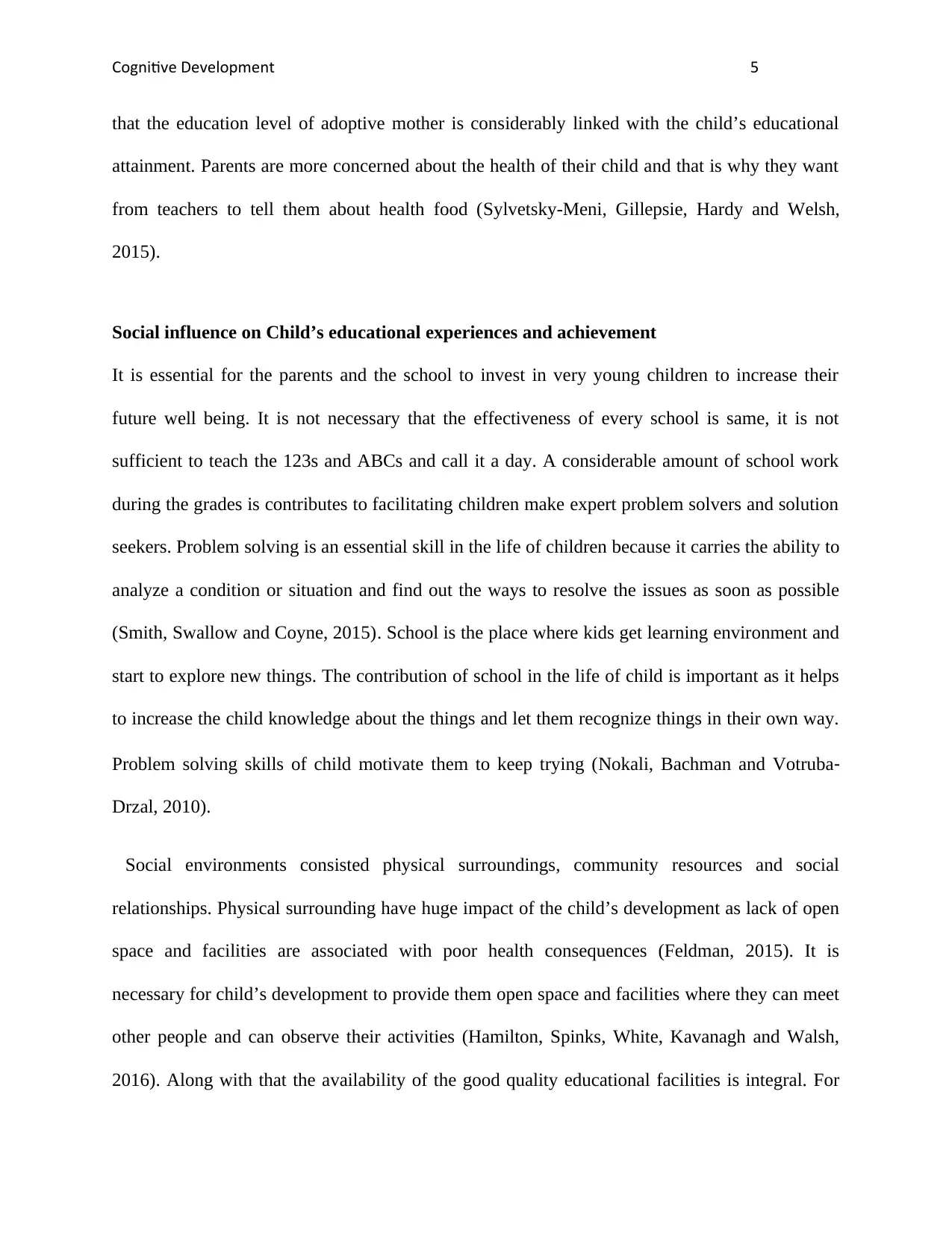
Cognitive Development 5
that the education level of adoptive mother is considerably linked with the child’s educational
attainment. Parents are more concerned about the health of their child and that is why they want
from teachers to tell them about health food (Sylvetsky-Meni, Gillepsie, Hardy and Welsh,
2015).
Social influence on Child’s educational experiences and achievement
It is essential for the parents and the school to invest in very young children to increase their
future well being. It is not necessary that the effectiveness of every school is same, it is not
sufficient to teach the 123s and ABCs and call it a day. A considerable amount of school work
during the grades is contributes to facilitating children make expert problem solvers and solution
seekers. Problem solving is an essential skill in the life of children because it carries the ability to
analyze a condition or situation and find out the ways to resolve the issues as soon as possible
(Smith, Swallow and Coyne, 2015). School is the place where kids get learning environment and
start to explore new things. The contribution of school in the life of child is important as it helps
to increase the child knowledge about the things and let them recognize things in their own way.
Problem solving skills of child motivate them to keep trying (Nokali, Bachman and Votruba‐
Drzal, 2010).
Social environments consisted physical surroundings, community resources and social
relationships. Physical surrounding have huge impact of the child’s development as lack of open
space and facilities are associated with poor health consequences (Feldman, 2015). It is
necessary for child’s development to provide them open space and facilities where they can meet
other people and can observe their activities (Hamilton, Spinks, White, Kavanagh and Walsh,
2016). Along with that the availability of the good quality educational facilities is integral. For
that the education level of adoptive mother is considerably linked with the child’s educational
attainment. Parents are more concerned about the health of their child and that is why they want
from teachers to tell them about health food (Sylvetsky-Meni, Gillepsie, Hardy and Welsh,
2015).
Social influence on Child’s educational experiences and achievement
It is essential for the parents and the school to invest in very young children to increase their
future well being. It is not necessary that the effectiveness of every school is same, it is not
sufficient to teach the 123s and ABCs and call it a day. A considerable amount of school work
during the grades is contributes to facilitating children make expert problem solvers and solution
seekers. Problem solving is an essential skill in the life of children because it carries the ability to
analyze a condition or situation and find out the ways to resolve the issues as soon as possible
(Smith, Swallow and Coyne, 2015). School is the place where kids get learning environment and
start to explore new things. The contribution of school in the life of child is important as it helps
to increase the child knowledge about the things and let them recognize things in their own way.
Problem solving skills of child motivate them to keep trying (Nokali, Bachman and Votruba‐
Drzal, 2010).
Social environments consisted physical surroundings, community resources and social
relationships. Physical surrounding have huge impact of the child’s development as lack of open
space and facilities are associated with poor health consequences (Feldman, 2015). It is
necessary for child’s development to provide them open space and facilities where they can meet
other people and can observe their activities (Hamilton, Spinks, White, Kavanagh and Walsh,
2016). Along with that the availability of the good quality educational facilities is integral. For
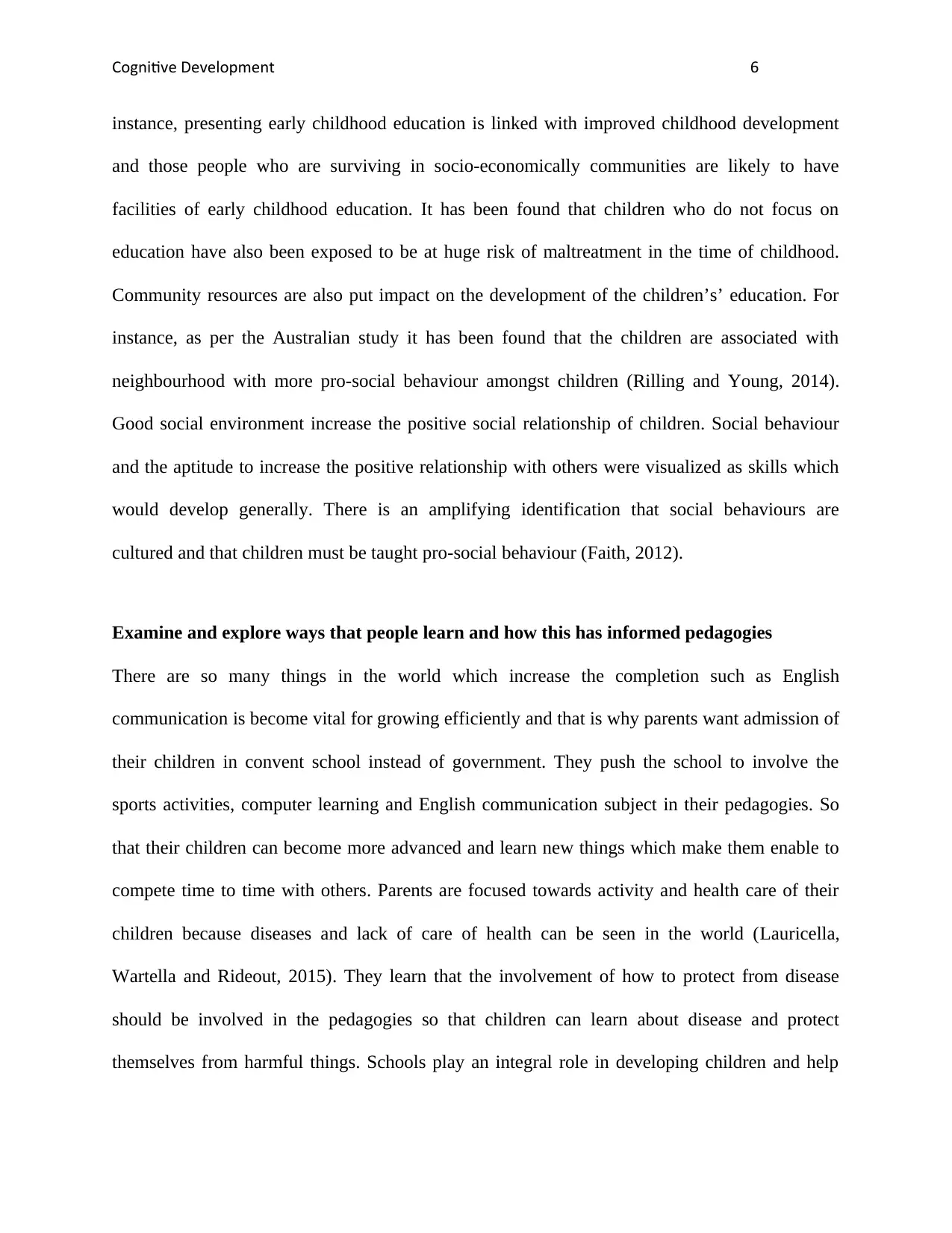
Cognitive Development 6
instance, presenting early childhood education is linked with improved childhood development
and those people who are surviving in socio-economically communities are likely to have
facilities of early childhood education. It has been found that children who do not focus on
education have also been exposed to be at huge risk of maltreatment in the time of childhood.
Community resources are also put impact on the development of the children’s’ education. For
instance, as per the Australian study it has been found that the children are associated with
neighbourhood with more pro-social behaviour amongst children (Rilling and Young, 2014).
Good social environment increase the positive social relationship of children. Social behaviour
and the aptitude to increase the positive relationship with others were visualized as skills which
would develop generally. There is an amplifying identification that social behaviours are
cultured and that children must be taught pro-social behaviour (Faith, 2012).
Examine and explore ways that people learn and how this has informed pedagogies
There are so many things in the world which increase the completion such as English
communication is become vital for growing efficiently and that is why parents want admission of
their children in convent school instead of government. They push the school to involve the
sports activities, computer learning and English communication subject in their pedagogies. So
that their children can become more advanced and learn new things which make them enable to
compete time to time with others. Parents are focused towards activity and health care of their
children because diseases and lack of care of health can be seen in the world (Lauricella,
Wartella and Rideout, 2015). They learn that the involvement of how to protect from disease
should be involved in the pedagogies so that children can learn about disease and protect
themselves from harmful things. Schools play an integral role in developing children and help
instance, presenting early childhood education is linked with improved childhood development
and those people who are surviving in socio-economically communities are likely to have
facilities of early childhood education. It has been found that children who do not focus on
education have also been exposed to be at huge risk of maltreatment in the time of childhood.
Community resources are also put impact on the development of the children’s’ education. For
instance, as per the Australian study it has been found that the children are associated with
neighbourhood with more pro-social behaviour amongst children (Rilling and Young, 2014).
Good social environment increase the positive social relationship of children. Social behaviour
and the aptitude to increase the positive relationship with others were visualized as skills which
would develop generally. There is an amplifying identification that social behaviours are
cultured and that children must be taught pro-social behaviour (Faith, 2012).
Examine and explore ways that people learn and how this has informed pedagogies
There are so many things in the world which increase the completion such as English
communication is become vital for growing efficiently and that is why parents want admission of
their children in convent school instead of government. They push the school to involve the
sports activities, computer learning and English communication subject in their pedagogies. So
that their children can become more advanced and learn new things which make them enable to
compete time to time with others. Parents are focused towards activity and health care of their
children because diseases and lack of care of health can be seen in the world (Lauricella,
Wartella and Rideout, 2015). They learn that the involvement of how to protect from disease
should be involved in the pedagogies so that children can learn about disease and protect
themselves from harmful things. Schools play an integral role in developing children and help
⊘ This is a preview!⊘
Do you want full access?
Subscribe today to unlock all pages.

Trusted by 1+ million students worldwide
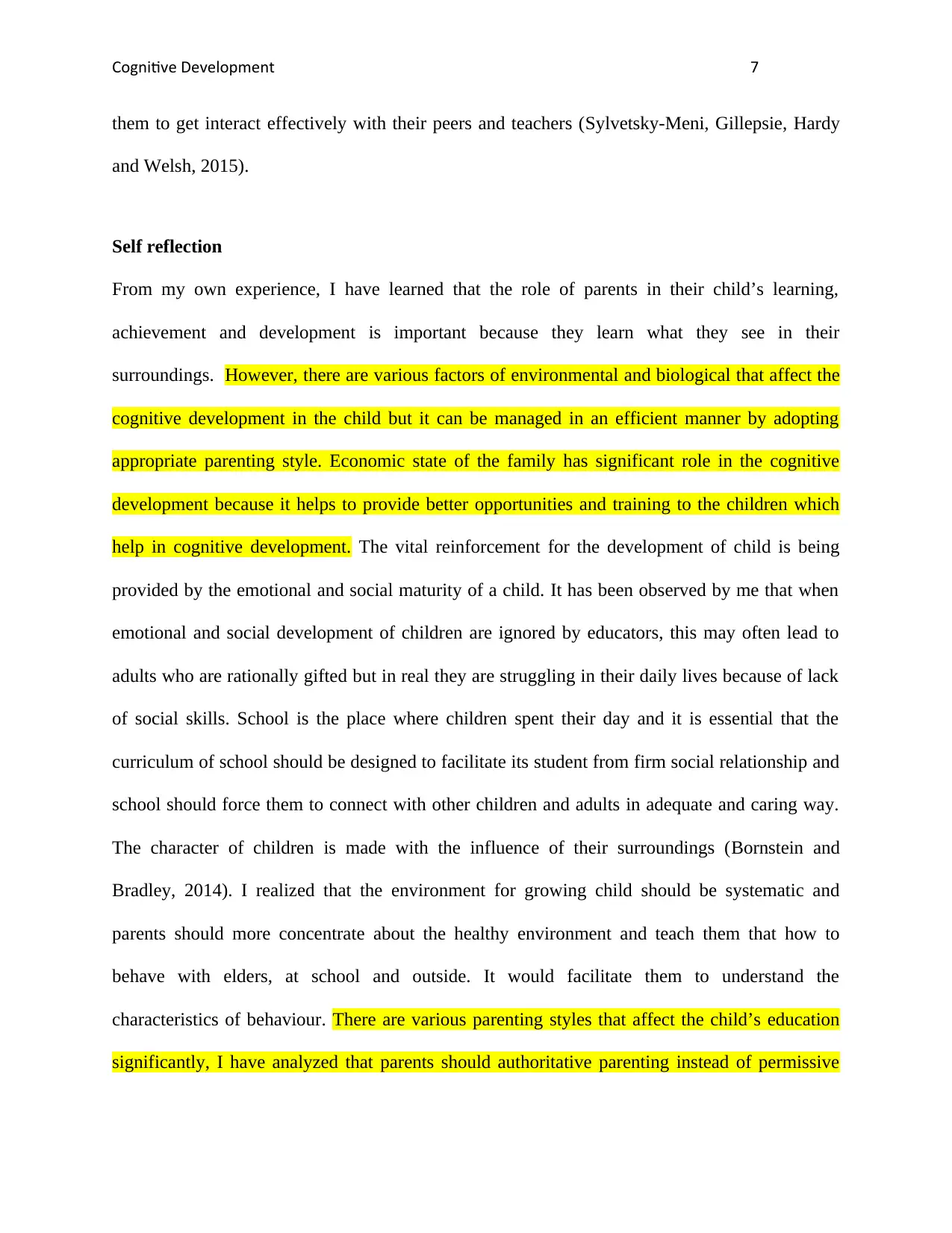
Cognitive Development 7
them to get interact effectively with their peers and teachers (Sylvetsky-Meni, Gillepsie, Hardy
and Welsh, 2015).
Self reflection
From my own experience, I have learned that the role of parents in their child’s learning,
achievement and development is important because they learn what they see in their
surroundings. However, there are various factors of environmental and biological that affect the
cognitive development in the child but it can be managed in an efficient manner by adopting
appropriate parenting style. Economic state of the family has significant role in the cognitive
development because it helps to provide better opportunities and training to the children which
help in cognitive development. The vital reinforcement for the development of child is being
provided by the emotional and social maturity of a child. It has been observed by me that when
emotional and social development of children are ignored by educators, this may often lead to
adults who are rationally gifted but in real they are struggling in their daily lives because of lack
of social skills. School is the place where children spent their day and it is essential that the
curriculum of school should be designed to facilitate its student from firm social relationship and
school should force them to connect with other children and adults in adequate and caring way.
The character of children is made with the influence of their surroundings (Bornstein and
Bradley, 2014). I realized that the environment for growing child should be systematic and
parents should more concentrate about the healthy environment and teach them that how to
behave with elders, at school and outside. It would facilitate them to understand the
characteristics of behaviour. There are various parenting styles that affect the child’s education
significantly, I have analyzed that parents should authoritative parenting instead of permissive
them to get interact effectively with their peers and teachers (Sylvetsky-Meni, Gillepsie, Hardy
and Welsh, 2015).
Self reflection
From my own experience, I have learned that the role of parents in their child’s learning,
achievement and development is important because they learn what they see in their
surroundings. However, there are various factors of environmental and biological that affect the
cognitive development in the child but it can be managed in an efficient manner by adopting
appropriate parenting style. Economic state of the family has significant role in the cognitive
development because it helps to provide better opportunities and training to the children which
help in cognitive development. The vital reinforcement for the development of child is being
provided by the emotional and social maturity of a child. It has been observed by me that when
emotional and social development of children are ignored by educators, this may often lead to
adults who are rationally gifted but in real they are struggling in their daily lives because of lack
of social skills. School is the place where children spent their day and it is essential that the
curriculum of school should be designed to facilitate its student from firm social relationship and
school should force them to connect with other children and adults in adequate and caring way.
The character of children is made with the influence of their surroundings (Bornstein and
Bradley, 2014). I realized that the environment for growing child should be systematic and
parents should more concentrate about the healthy environment and teach them that how to
behave with elders, at school and outside. It would facilitate them to understand the
characteristics of behaviour. There are various parenting styles that affect the child’s education
significantly, I have analyzed that parents should authoritative parenting instead of permissive
Paraphrase This Document
Need a fresh take? Get an instant paraphrase of this document with our AI Paraphraser

Cognitive Development 8
and authoritarian parenting because it is the combination of warmth and expectations. By
following this style, parents can enhance the cognitive development in their child.
and authoritarian parenting because it is the combination of warmth and expectations. By
following this style, parents can enhance the cognitive development in their child.
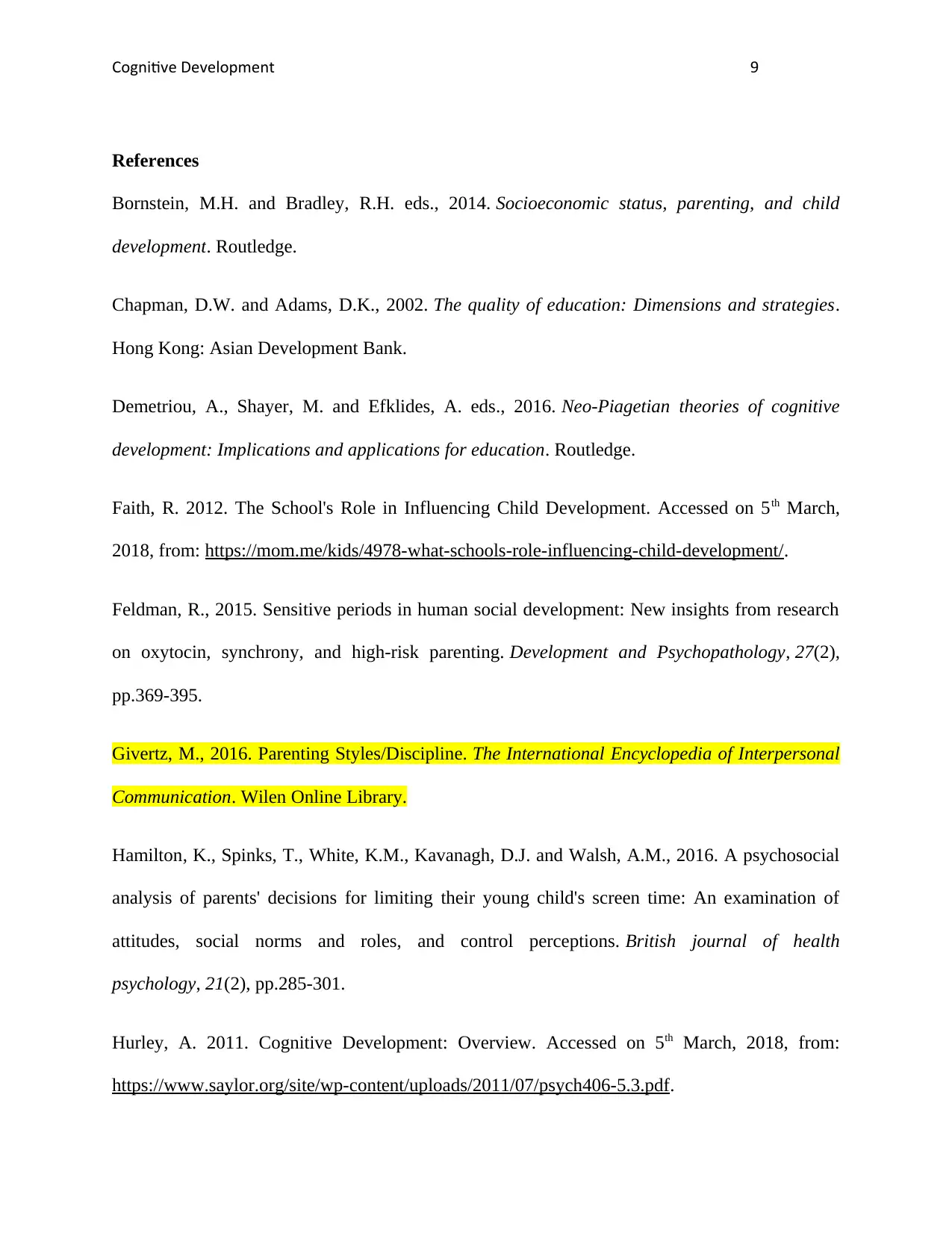
Cognitive Development 9
References
Bornstein, M.H. and Bradley, R.H. eds., 2014. Socioeconomic status, parenting, and child
development. Routledge.
Chapman, D.W. and Adams, D.K., 2002. The quality of education: Dimensions and strategies.
Hong Kong: Asian Development Bank.
Demetriou, A., Shayer, M. and Efklides, A. eds., 2016. Neo-Piagetian theories of cognitive
development: Implications and applications for education. Routledge.
Faith, R. 2012. The School's Role in Influencing Child Development. Accessed on 5th March,
2018, from: https://mom.me/kids/4978-what-schools-role-influencing-child-development/.
Feldman, R., 2015. Sensitive periods in human social development: New insights from research
on oxytocin, synchrony, and high-risk parenting. Development and Psychopathology, 27(2),
pp.369-395.
Givertz, M., 2016. Parenting Styles/Discipline. The International Encyclopedia of Interpersonal
Communication. Wilen Online Library.
Hamilton, K., Spinks, T., White, K.M., Kavanagh, D.J. and Walsh, A.M., 2016. A psychosocial
analysis of parents' decisions for limiting their young child's screen time: An examination of
attitudes, social norms and roles, and control perceptions. British journal of health
psychology, 21(2), pp.285-301.
Hurley, A. 2011. Cognitive Development: Overview. Accessed on 5th March, 2018, from:
https://www.saylor.org/site/wp-content/uploads/2011/07/psych406-5.3.pdf.
References
Bornstein, M.H. and Bradley, R.H. eds., 2014. Socioeconomic status, parenting, and child
development. Routledge.
Chapman, D.W. and Adams, D.K., 2002. The quality of education: Dimensions and strategies.
Hong Kong: Asian Development Bank.
Demetriou, A., Shayer, M. and Efklides, A. eds., 2016. Neo-Piagetian theories of cognitive
development: Implications and applications for education. Routledge.
Faith, R. 2012. The School's Role in Influencing Child Development. Accessed on 5th March,
2018, from: https://mom.me/kids/4978-what-schools-role-influencing-child-development/.
Feldman, R., 2015. Sensitive periods in human social development: New insights from research
on oxytocin, synchrony, and high-risk parenting. Development and Psychopathology, 27(2),
pp.369-395.
Givertz, M., 2016. Parenting Styles/Discipline. The International Encyclopedia of Interpersonal
Communication. Wilen Online Library.
Hamilton, K., Spinks, T., White, K.M., Kavanagh, D.J. and Walsh, A.M., 2016. A psychosocial
analysis of parents' decisions for limiting their young child's screen time: An examination of
attitudes, social norms and roles, and control perceptions. British journal of health
psychology, 21(2), pp.285-301.
Hurley, A. 2011. Cognitive Development: Overview. Accessed on 5th March, 2018, from:
https://www.saylor.org/site/wp-content/uploads/2011/07/psych406-5.3.pdf.
⊘ This is a preview!⊘
Do you want full access?
Subscribe today to unlock all pages.

Trusted by 1+ million students worldwide
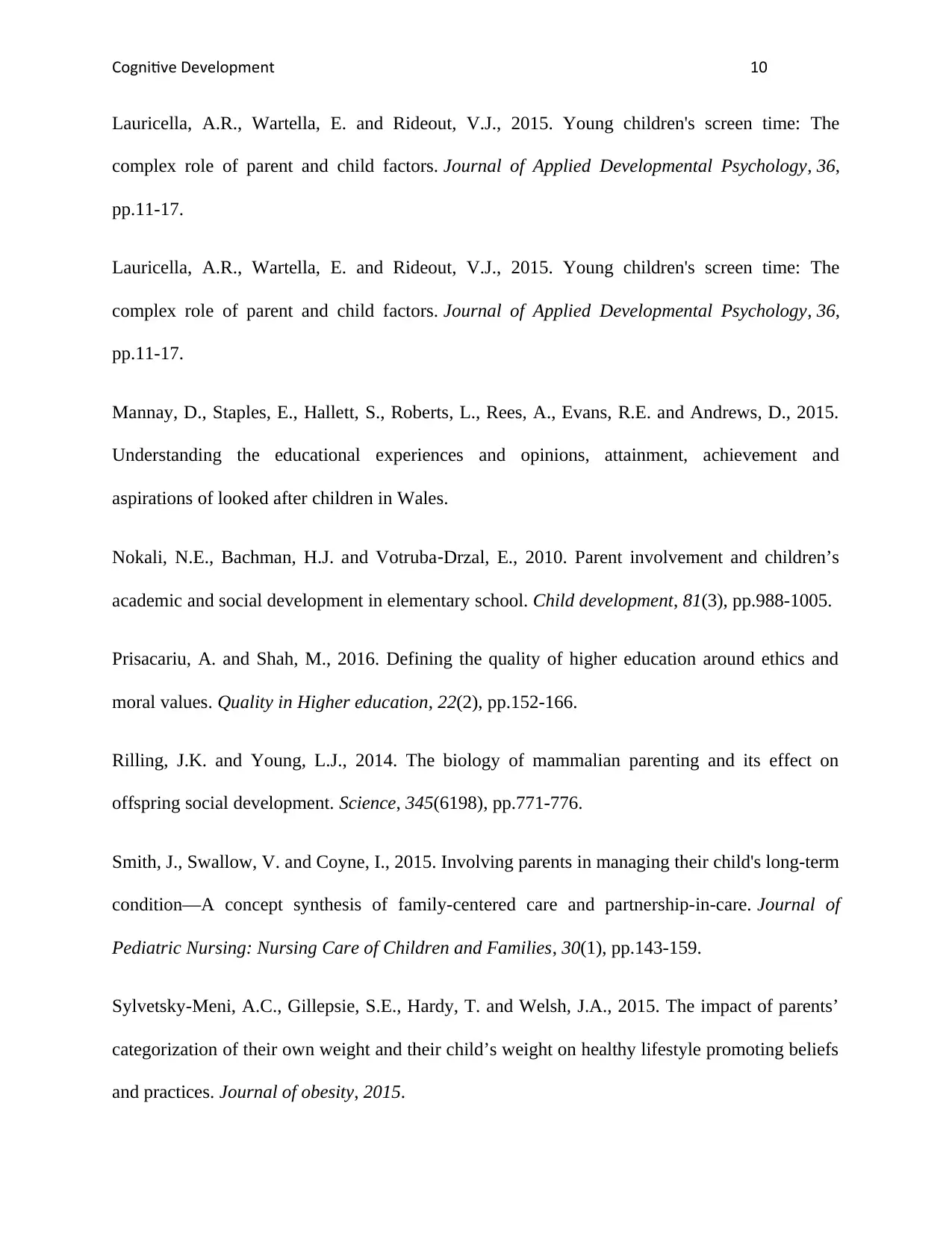
Cognitive Development 10
Lauricella, A.R., Wartella, E. and Rideout, V.J., 2015. Young children's screen time: The
complex role of parent and child factors. Journal of Applied Developmental Psychology, 36,
pp.11-17.
Lauricella, A.R., Wartella, E. and Rideout, V.J., 2015. Young children's screen time: The
complex role of parent and child factors. Journal of Applied Developmental Psychology, 36,
pp.11-17.
Mannay, D., Staples, E., Hallett, S., Roberts, L., Rees, A., Evans, R.E. and Andrews, D., 2015.
Understanding the educational experiences and opinions, attainment, achievement and
aspirations of looked after children in Wales.
Nokali, N.E., Bachman, H.J. and Votruba‐Drzal, E., 2010. Parent involvement and children’s
academic and social development in elementary school. Child development, 81(3), pp.988-1005.
Prisacariu, A. and Shah, M., 2016. Defining the quality of higher education around ethics and
moral values. Quality in Higher education, 22(2), pp.152-166.
Rilling, J.K. and Young, L.J., 2014. The biology of mammalian parenting and its effect on
offspring social development. Science, 345(6198), pp.771-776.
Smith, J., Swallow, V. and Coyne, I., 2015. Involving parents in managing their child's long-term
condition—A concept synthesis of family-centered care and partnership-in-care. Journal of
Pediatric Nursing: Nursing Care of Children and Families, 30(1), pp.143-159.
Sylvetsky-Meni, A.C., Gillepsie, S.E., Hardy, T. and Welsh, J.A., 2015. The impact of parents’
categorization of their own weight and their child’s weight on healthy lifestyle promoting beliefs
and practices. Journal of obesity, 2015.
Lauricella, A.R., Wartella, E. and Rideout, V.J., 2015. Young children's screen time: The
complex role of parent and child factors. Journal of Applied Developmental Psychology, 36,
pp.11-17.
Lauricella, A.R., Wartella, E. and Rideout, V.J., 2015. Young children's screen time: The
complex role of parent and child factors. Journal of Applied Developmental Psychology, 36,
pp.11-17.
Mannay, D., Staples, E., Hallett, S., Roberts, L., Rees, A., Evans, R.E. and Andrews, D., 2015.
Understanding the educational experiences and opinions, attainment, achievement and
aspirations of looked after children in Wales.
Nokali, N.E., Bachman, H.J. and Votruba‐Drzal, E., 2010. Parent involvement and children’s
academic and social development in elementary school. Child development, 81(3), pp.988-1005.
Prisacariu, A. and Shah, M., 2016. Defining the quality of higher education around ethics and
moral values. Quality in Higher education, 22(2), pp.152-166.
Rilling, J.K. and Young, L.J., 2014. The biology of mammalian parenting and its effect on
offspring social development. Science, 345(6198), pp.771-776.
Smith, J., Swallow, V. and Coyne, I., 2015. Involving parents in managing their child's long-term
condition—A concept synthesis of family-centered care and partnership-in-care. Journal of
Pediatric Nursing: Nursing Care of Children and Families, 30(1), pp.143-159.
Sylvetsky-Meni, A.C., Gillepsie, S.E., Hardy, T. and Welsh, J.A., 2015. The impact of parents’
categorization of their own weight and their child’s weight on healthy lifestyle promoting beliefs
and practices. Journal of obesity, 2015.
1 out of 10
Related Documents
Your All-in-One AI-Powered Toolkit for Academic Success.
+13062052269
info@desklib.com
Available 24*7 on WhatsApp / Email
![[object Object]](/_next/static/media/star-bottom.7253800d.svg)
Unlock your academic potential
Copyright © 2020–2026 A2Z Services. All Rights Reserved. Developed and managed by ZUCOL.





